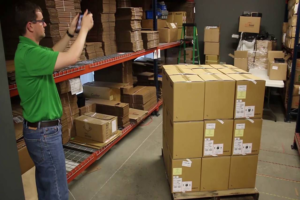Number of Sites – 1
Quote
“The amount of rejected loads have decreased significantly. WE WILL HAVE 4 to 6 TRAILERS REJECTED PER WEEK, NOW THAT HAS GONE DOWN TO MAY BE 1 A WEEK. It has been a fantastic tool for us – It is very easy to use, it can save a lot of $$$, we are already looking to Upgrade”. – Ryan Bicksler, General Manager, Berner Foods.
Transcript
Puga:
All right. Brian, thank you for taking the time to join this interview and thank you for offering to share your experience with using LoadProof. So let’s start from the beginning, where were you guys before you found out about this tool called LoadProof and what was the problem you’re trying to solve and what were some of the frustrations.
Ryan:
Before we found out about LoadProof my company is a 3pl company for berner food and beverage. We were seeing particularly from our transport division, we were seeing a lot of loads that were going out that would be secure from our end. It would be good in all aspects and safe for transit and then one day would arrive at destinations.
They need tips and they will be all over it. It will be a mess before, we were just kind of we would take some pictures with our phone. We didn’t really have anything to correlate or capture like what we were recording so we actually heard about a LoadProof from another company that works for the same customer there they also use LoadProof.
So we heard about how well it was working for them I looked into it I decided “hey let’s give it a shot”, and it’s worked out great I mean we’ve been able to capture our data from our end it’s been simple to use we’ve been able to record the trailer numbers, from what side it was coming off of from our docks and perhaps the biggest thing for us is it’s all just conveniently stored into like one area we don’t have multiple people trying to share pictures and trying to correlate getting it all together it’s worked out great so much so that we continue to roll it out across our different facilities as well now.
Puga –
Great great great that’s fantastic, so how did you first hear about us I mean it was it like “hey I have this problem man I mean I don’t know how to solve this and we know how so from your school”, was that like a conversation that started somewhere.
Ryan –
Yeah so I was talking with the general manager for the other company, I’m general manager for our company for this area and uh I was just saying “hey we’re seeing all the transportation stuff here’s what’s going on I brought in there our transportation department saying like “hey what can we do the GM for the other company it was like we use loadproof that way we can just capture everything it’s right there, it’s right there, our customers want to see that it’s right there and the transportation department wants to see it’s like you could look into that and I was like “okay let me do a little bit of background I hadn’t heard about LoadProof prior to that one oh dear guys his website started looking at us through and I was like okay”,
I’ll give it a shot we’ll see if this works for my company. I signed up a little bit to go through the setup but then once we got it rolled out yeah it’s been a great tool for my company.
Puga –
Okay got it
Ryan –
Yep that’s how we kind of heard about loadproof.
Puga –
So what is the problem you guys have I mean as a food distributor what are some of your products is it like dry produce or frozen items
Ryan –
It is a lot of what we knew is jarred cheese, coffee beverages and then aerosol cheese so when we would have stopped that for instance my main warehouse is out at the production facility for berner food and beverage.
So when we get the finished product we send it over to their company, so they can actually store it so when we were loading stuff into the trailers like the jar cheese, again like some of our aerosol cheese’s we would double stick in we won’t bar everything like that jarred cheese’s, we would just single stack in but when we would send it off again everything would look good from our end we would airbag, we would put load bars, but then when it was arriving to them they would reject the load back to us because by the time it got back to them or got to them you’d have some pallets in the front that we’re getting tipped and it was a situation where it was like okay we need something because we know this is now more becoming a transportation problem but we need something that can kind of capture our data and say “hey what instead of you rejecting it back to us we actually need to look at the root cause and I actually need to go to the transportation department but I need something to actually prove this”.
So again we would take some pictures with the supervisors on the floor with their phones we would do that but we didn’t really have anything that was all correlating into just one area where again if they were to come to me and say okay on August 15th trailer 537281 got rejected back do you guys have any pictures of it. It’s so simple because I can go back to August got set up here are the pictures, which supervisor was working that shift, what trailer did they get me today, actually capturing the trailer number in their pictures makes things a lot simpler for us.
Ryan –
Got it,
Ryan –
There’s all these cheese getting shipped in cold containers or something like that some kind of depends on the time of year so a lot of the cheese and stuff right now is being shipped on dry bands once we get closer to the colder climates because it’s in jars, we want to start shipping more on refrigerator trailers, just because of the fact of depending on how quickly they offload it on the other end.
It can’t sit for a very long portion of times particularly since we do hot fill so when you go hot to cold a lot of the jars going up just breaking so right now we do a lot of just just dry shipments but as we start getting to the colder climates yeah we’ll start utilizing some more reefers in terms of transportation.
Puga –
Kind of good so what made you guys pull it together bigger to be able to do this I mean it’s not about the cost, like “oh it’s a very less expensive tool”, what made you guys pull the trigger on it “hey we gotta have this”.
Ryan –
It was just the amount of damages that were coming back to us that were getting rejected back so again I mean we knew some of this was being caused by the transportation department but again we didn’t really have any correlation that hey we need something and even if it wasn’t a transportation issue we need something that said okay we’re seeing.
I think one week we had seven trailers rejected back to us so it’s like okay we’re getting a lot of trailers rejected back we need something to find, A. What the root cause is and B. Just something we can immediately go back to and not have to date through data and everything like that.
So what kind of brought it all on was just the fact that we needed it was just the amount we were seeing the amount of loads getting rejected to us and then just having something saying okay from our end we did everything properly so we need to figure out where the actual root cause is actually coming from.
Puga –
Great great great fantastic, so what are some of the benefits I mean you have turned on LoadProof how was the experience like, I mean how well the experience.
Ryan –
So far it’s been really good again. We’re rolling it out more and more across different shifts in different facilities when we initially brought it online there we had to get a kind of like stuff and how we wanted to have it set up so for instance which side of it was coming off of the trailer things like that.
We introduced it gradually and as we started seeing some more pictures come across it’s like okay this has been great I mean as we started activating LoadProof it coincidentally we started seeing less and less rejected trailers coming off of those shifts. So it’s like okay and when there has been an issue we can just point back and say okay here’s the pictures that you need as you can see we sent a load, we can get saved so yeah I mean it’s we had a kind of a gradual roll-out with it but it’s been positive experience that we’re continuing to roll out across more shifts and honestly I’m looking at possibility of upgrading our plan so I can get more licenses.
Puga –
Fantastic, you don’t hear a lot of systems that we roll out in the supply chain. Not all the experience is known to be great like this right I mean and one thing that we often run into is change management how people got adapted to this.
Ryan –
They’ve adapted fairly well to it I mean we’ve got the licenses assigned right now to our supervisors but, we have our team leaders on taking pictures as well again we it’s so easy to use that I mean there’s not really a lot to it where everyone’s kind of adapted and handle it fairly well.
So I mean it’s again it’s been a fairly easy process for us to just adapt to and start integrating into our shifts and what we do on a day-in day-out basis.
Puga –
Fantastic so what results you guys have accomplished and what areas of your business has has this improved from your perspective.
Ryan –
So the biggest area that’s been an improvement for us is just the amount of rejected loads we’ve seen just decreased. So again, we were having at least four to six loads across a week’s time kind of get rejected back to us because something would happen or would be a situation where we didn’t load it properly so for us it’s kind of improved.
We’ve been able to send our product out to not only the other 3pl but to the supplier or the customers that it actually reaches because when you don’t have stuff it’s making our people more conscious of what they’re doing and making sure that the products getting transported safely and it’s in the end result making sure that the customers get the product in good condition and integrity as well. So I mean I think that’s been the biggest thing for us is you’ve just seen that reduction versus what we’ve had before.
We do a hundred a week that we ship out but even four to six rejects is too much and we’ve seen that I mean I don’t think we’ve had a rejected load now for a couple weeks and we went from like four to six down maybe one a week so yeah our average is really dropped which was great to see.
Puga:
Okay fantastic how likely you had to recommend us to somebody else, I mean “hey we use LoadProof and could you recommend us to somebody else that have similar problem.
Ryan:
yes definitely it’s a situation where again it’s for us it’s just been so convenient having everything in that one area it’s so easy to use it’s definitely a situation where if someone were to come to me and say I’m having this issue I would definitely recommend it to somebody else because again it’s been a fantastic tool for what we do that.
I would definitely recommend it so why should someone listening to this video watching this video take action right now why should they use this tool right now again it’s just because of the fact of how easy it is to use and how much it actually potentially can save you.
Just in costs for what specific application you use it for. Again when you have rejected trailers coming back I mean that means if we’ve had damaged products we’ve had not only that we have coordinated like the transportation cost and bringing things back.
If it’s just been so helpful because of the fact again it’s easy to use it was easy for anyone to understand and utilize it and in the long run it’s just so great to actually utilize this tool where it actually can save you so much down the line and improve the efficiency of your operation that I have been alone. It made it more than worth,
Puga:
It’s kind of fantastic what was your ROI from using this tool.
Ryan:
We have seen two types of savings one is obviously less claims less rejections less stuff coming back and that directly translate to the product cost, inventory cost, that’s one thing and then second in terms of labor because you’re not spending more time discussing this in your meetings, I mean and that’s been the biggest thing I mean again from across savings for us I mean again we don’t have to be able to transportation costs of it coming back we don’t have to deal with a full of damage cost because we’ve had roads that have shifted and gotten damaged and broken all over but yeah even from like a labor standpoint as well to when we have gotten loads back we were like that it was a situation where we’d actually have to designate man-hours.
So depending on the load and what was in it we’ve one of our rejected loads that stands out 53 pallets that were double stacked and that ended up spilled all over. We ended up to people for about a total of 12 labor hours each so 24 man hours just to get that trailer cleaned up so again if it works in the fact we’re for our guys that forces them and that specific instance it was a situation where we didn’t secure it properly so again from cost savings it’s just been tremendous, because of the fact that we don’t have that much cost anymore to get these items fixed. It forces our guys to do the proper thing and make sure that our loads are secure all the way around because they have to take that picture and basically state that they’re doing our processes and procedures. But then I said – it also makes a situation where if it occurs due to transportation we’ve go back to transportation and say “okay we have these damages but you can see we have everything done properly from our end we’re actually going to hand this one over to you guys to figure out the cost and how you want to get back to the customer, in regards to this because this is more of a transportation issues so yeah from a cost perspective not only from a labor hour wise but from the actual cost of bringing the damages yeah we’ve seen that definitely a major reduction of both. It is possible to put a high-level dollar value savings per month or something like that there if I put a savings per month on it it would probably be in probably $10,000 plus per month.
Based off of the damages that we don’t have to write it off or things like that plus of our labor hours I would say it’s been $10,000 plus per month so in a 12 year or 12 month span we’re probably talking over a hundred thousand dollars so we would say, but on average just by utilizing this fantastic tool.
About the labor that spend on fixing stuff for talking about that making sure it does not happen “hey who did this who loaded this”
Puga –
yeah yeah definitely.
Ryan –
I mean again it’s a situation where it also forces our people to do the right thing where then we don’t have to do in our startup meetings we don’t have to cover like okay guys here’s a trailer that just came back to us from the other 3pl, if you can see it wasn’t loaded properly or this happened
Puga –
yeah
Ryan –
I mean from a tiny perspective it’s well – it helps that we have less of those obviously it’s more people that we don’t have to designate to clean up trailers but we also keep our people more on the floor doing the tests that they need to be doing for news
I mean that’s fantastic. Who’d be glad to not be able to save that many dollars from you guys not only that. I mean the unnecessary hassle that you go through you might lose customers and it’s just life is so much peaceful and like I said it’s it’s really been tremendous a couple months we’ve been utilizing it so again we’re in the process of rolling it out to more of our shifts and our facilities so yeah definitely recommend.
Puga –
Fantastic thank you very much.




 1. Increases EPP, using budgeted line items.
1. Increases EPP, using budgeted line items. Millennial friendly technology, less onboarding time, very easy adoption – touch screen keypad, and 43% of Millennials already use IOS, familiar with Facetime, 85% of Millennials aged 18-24 own devices and 86% aged 25-34 own them, consume a lot of video on their smartphones, and are highly comfortable with this medium, they understand and like apps.
Millennial friendly technology, less onboarding time, very easy adoption – touch screen keypad, and 43% of Millennials already use IOS, familiar with Facetime, 85% of Millennials aged 18-24 own devices and 86% aged 25-34 own them, consume a lot of video on their smartphones, and are highly comfortable with this medium, they understand and like apps.